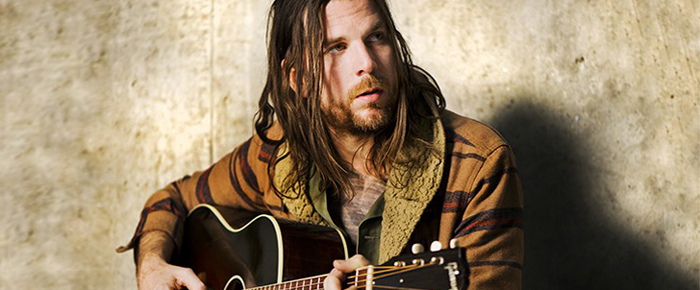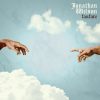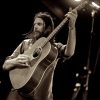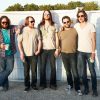
By Eleni P. Austin
Jonathan Wilson is often referred to as the wunderkind of Laurel Canyon. Having just turned 39, he isn’t really that young. However, he is a generation younger than the septuagenarian musicians who populated that bohemian enclave back in the sixties.
Back then the tiny canyon that separated glamorous Hollywood from the Brady Bunch-y San Fernando Valley, was home to seminal Los Angeles musicians like the Byrds, Joni Mitchell, Peter Tork, Frank Zappa, Jackson Browne, Gram Parsons, Warren Zevon, Jim Morrison, Mama Cass and the Buffalo Springfield.
By the early 80s, most Canyon denizens had migrated to Bel Air and Malibu. The rustic charms of Canyon life was supplanted by cocaine cowboys and life in the fast lane. It took another 20 years, but by the21st century, Jonathan Wilson managed to return musical focus to Laurel Canyon.
Jonathan Wilson is a native of Forest City, South Carolina. His grandfather was a Baptist preacher and his dad was a musician and band leader. Jonathan mastered guitar and piano at a young age. He hooked up with Benji Hughes and they formed the band Muscadine. In 1998, they released an album through Sire records.
Wilson arrived in L.A. with Muscadine. The band folded, but he persevered by learning the basics of engineering and producing. He also amassed an impressive collection of analog recording equipment. Setting up a recording studio, he provided production and worked as a session musician for an impressive array of artists including; Shooter Jennings, Erykah Badu, Elvis Costello and Jenny Lewis.
At the same time, he began hosting informal Wednesday night jam sessions at his Laurel Canyon house. The weekly event attracted bands like the Wallflowers, Black Crowes and Dawes, along with Canyon elder statesmen like Jackson Browne and Graham Nash.
In between production work and touring, Jonathan began working on his own solo material. His debut, FrankieRay was never formally released. Instead, Wilson just handed out CD-Rs to friends and fans.
Gentle Spirit arrived in late 2011. Best described as Neil Young’s Harvest meets Pink Floyd’s Dark Side Of The Moon, the album garnered rave reviews and landed in several Top 10 lists. British music mags MOJO and Uncut both named him Best New Artist of 2011.
The following year, Wilson was back behind the mixing board producing Man & Myth for legendary British Folk musician, Roy Harper. He also assisted Father John Misty with his first “official” solo effort, Fear Fun. As 2013 wound down, Wilson released Fanfare.
The album opens with the title track, a lengthy and ornate overture accented by warm piano tones, mellotron, pounding percussion, Moog synthesizer and flugelhorn. It’s a full three minutes before Wilson’s vocals come in, husky with regret, yearning for a romance that has already failed.
On both “Her Hair Is Growing Long” and “Illumination” Wilson handles all the instrumentation himself. The former is a confessional ballad that blends feather soft acoustic guitar notes. The melody recalls the early 70s gravitas of Led Zeppelin’s epic “Stairway To Heaven” and Crosby, Stills & Nash’s “Guinnevere.”
The latter is anchored by pummeling drums, skronky, broken shards of guitar and floofy keyboard runs. The stop-start meter and Wilson’s falsetto are mindful of Neil Young’s “Hey Hey, My My (Into The Black).” The mood is dour and downcast as Wilson details an emotional abyss… “All my faculties are empty.” The track ends with an extended organ-guitar coda.
The album’s best four tracks are “Love To Love,” “Future Vision,” “Moses Pain” and “Cecil Taylor” and they arrive one after the other.
“Love To Love” offers a pocket history of Wilson’s pilgrimage to Los Angeles. A chugging rhythm propels jangly guitars and soulful organ fills. The lyrics name check L.A. landmarks like Topanga, Hollywood and Yamashiro.
As the title implies, “Future Vision” is rife with portentous proclamations about infatuation…”She’ll make you feel the sweet caprice of love again.” Pedal steel guitar and tumbling drums get the track off to a raucous start, but midway through, the melody pivots on a dime, locking into a Honky Tonk piano groove. Swirly-psych seagull guitar riffs give way to a sweet piano finish.
“Moses Pain” is the album’s centerpiece. Blending the country comfort of Elton John’s “Levon,” with the expansive storytelling of Jackson Browne’s epochal “Running On Empty.” Moses is a would-be troubadour who escapes rural poverty for a life on the road.
The instrumentation is a perfect storm of guitar, bass, Hammond organ and harmonica. Cresting over the arrangement are Mike Campbell’s graceful slide guitar and Benmont Tench’s soaring piano.
“Cecil Taylor,”is named for the octogenarian Jazz pianist. But the song is the antithesis of the avant-garde style Taylor pioneered in the 50s. Anchored by finger-picked acoustic guitar and a metronome beat, Wilson’s ethereal, multi-tracked vocals are front and center. Completing the spiritual torch pass, David Crosby and Graham Nash chime in with their distinctive, celestial harmonies.
The percolating “New Mexico” was co-written with British Folk icon Roy Harper. It features a flashy flute solo that would make “Anchorman” Ron Burgandy blush! Handling all the instruments except sax, Wilson wanders into Steely Dan territory with an adroit cover of Sopwith Camel’s “Fazon.”
Other interesting tracks include the melancholy waltz of Dear Friend,” the arid serenity of “Desert Trip,” and “Love Strong.” That song is Wilson at his most ambitious. The instrumentation is by turns lush and spiky, blending burnished piano runs, Prog-Rock/Folkadelic guitar riffs, clavinet, synthesizer, mellotron and cello.
Fanfare closes with the wistful “All The Way Down.” A repeated cluster of guitar chords forms the bare bones melody. Swirling in and out are piano, percussion, vibes mellotron, chamber radio and a string section, another sad lament of love gone wrong.
Clocking in at nearly 80 minutes, Fanfare offers 13 songs of exhilarating highs and lacerating lows. On this album Wilson seems to take inspiration from eccentric singer-songwriters like Harry Nilsson and Leon Russell.
It’s also apparent he has spent time exploring the solo work of Dennis Wilson. (While Brian Wilson was the brains behind the Beach Boys, Dennis was the band’s soul. The only real surfer in the group, Dennis recorded an amazing solo effort, Pacific Ocean Blue in 1977. Sadly, he was at work on a follow up when he died in a drowning accident 30 years ago).
Jonathan Wilson was born at the wrong time. Had this record been released the year he was born in 1974, it would be been as essential as George Harrison’s All Things Must Pass, Nilsson Schmilsson or John Lennon’s Plastic Ono Band.
This is “headphone music.” We live in a disposable, downloadable world where the tinny convenience of “earbud music” has made it simple and easy to aquire music. But it takes an effort to really listen. Do yourself a favor and find time to really listen to Fanfare. Your ears will thank you.

















































